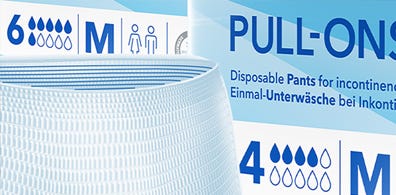Switching To Decaf: Does Caffeine Affect Incontinence?



Amid the festive season’s hustle and bustle, many people opt for caffeinated drinks for a boost of much-needed energy.
With cafes offering Christmas menus stacked with sweet coffees topped with whipped cream, it’s easier than ever to overdo it on caffeine. However, caffeine can pose a problem if you’re living with incontinence.
In our latest blog post, we’re going to look closer at the connection between caffeine and incontinence, assessing whether switching to decaf is actually as easy as people say – and the possible benefits of doing so.
What is caffeine?
Before we delve into the effects caffeine has on incontinence, it’s important to understand exactly what caffeine is.
Caffeine is a naturally occurring compound found in things like coffee, tea and various other plants. Caffeine acts as a stimulant, entering your bloodstream and travelling to your brain, where it blocks the neurotransmitters that make you feel tired. Having been used for centuries to improve alertness, caffeine has since morphed into modern-day coffees and teas we know and love.
However, these tasty treats can come at a cost, with the effects of caffeine lasting up to five hours and taking even longer to leave your body completely.
How does caffeine affect your bladder?
Caffeine affects more than just your alertness, particularly if you experience bladder incontinence. Therefore, understanding the link between caffeine and your bladder is crucial to reducing any unwanted incontinence effects.
Caffeine has diuretic properties which means it stimulates your urine production. When you drink anything caffeinated, the caffeine interferes with the reabsorption of water in your kidneys, causing more liquid to be released as urine. While this may not be of huge concern to some people, those dealing with incontinence may find that drinking tea or coffee negatively impacts their bladder control.
Caffeine can also mildly irritate your bladder muscles, potentially exacerbating symptoms of urinary urgency and frequency.
The caffeine stimulation in your bladder may even cause you to be more prone to spasms or contractions, increasing your risk of incontinence.
So, while it may seem like a good idea to warm up with a festive gingerbread latté while out Christmas shopping, it could have some negative side effects if you have bladder incontinence.



The benefits of drinking decaf
The world of decaffeinated alternatives is a lot broader (and tastier) than it ever used to be. More and more coffee shops now offer decaf versions of their drinks and many people struggle to taste the difference.
So, why not try it for yourself? Here are some of the benefits that drinking decaf this winter can offer:
More gentle on your bladder – decaf drinks can provide you with the same warmth and flavour, just without the diuretic effects. Drinking decaf prevents the overstimulation of your bladder and stops the overproduction of urine, making it much easier to control your bladder.
Reduced irritation – decaffeinated drinks don’t have the same bladder-irritating properties so you will be much less likely to endure bladder spasms that lead to loss of control.
Restful, dry nights – caffeine can disrupt your sleep and cause you to go to the toilet throughout the night. Switching to decaf can greatly reduce your risk of nighttime loss of bladder control – and you’ll also wake up feeling much more refreshed.
A balance of enjoyment and bladder health – the festive season is all about indulgence and spending time with loved ones. Choosing decaf allows you to enjoy your favourite Christmas drinks without compromising your bladder health. You will also feel much more confident during get-togethers if you make the switch to decaf, as your risk of incontinence will be decreased.
Greater bladder control – by making the change to decaf, you can enjoy much greater control over your bladder, boosting your confidence over the winter months.
Reduced risk of bladder urgency – opting for a decaf drink reduces your risk of bladder urgency, allowing you to stay present during family moments of festive joy.
The ‘Taste The Difference Challenge’
The ‘Taste The Difference Challenge’ was launched by the UHL Continence Team in 2021, with the aim of promoting decaffeinated teas and coffees in healthcare settings to reduce the effects of incontinence.
The idea behind the project came about when it was found that caffeinated drinks were routinely offered to hospital patients, increasing the rate of incontinence.
However, since many staff were not aware of the impact caffeine was having, the challenge to switch towards decaffeinated drinks was born.
During the challenge, over 50% of the 700 patients who accepted decaffeinated drinks could not taste the difference and over 76% said they would be happy to switch to decaf after discovering the benefits.
The Taste The Difference challenge can be transferred to any hospital, community group or residential care home to try and reduce the effects of caffeine on incontinence. So, why not partake in your own Taste The Difference Challenge this festive season to see the benefits to your bladder?



Discover incontinence products with Attends
Caffeinated drinks might be a staple in your routine, but they could also be hindering your bladder health. Making the switch to decaf can be a great way to regain some control over your bladder and reduce your risk of potential accidents during the festive season and beyond.
This Christmas, unwrap the joy of decaffeinated drinks and support your bladder health even further by choosing Attends for your incontinence needs. We offer a wide range of products for both men and women, providing you with multiple options to suit your needs.
To find the right product for you, simply answer these six simple questions.
Discover our incontinence protection products and receive the bladder support you deserve.
Sources
Leicester Hospitals - Taste The Difference Challenge

Sexual Health & Incontinence

Which Medications Can Cause Incontinence?

Incontinence in Young Women: Key Causes

Nocturia & Nocturnal Enuresis (Adult Bedwetting)

How To Stop Urine Leakage When Coughing



